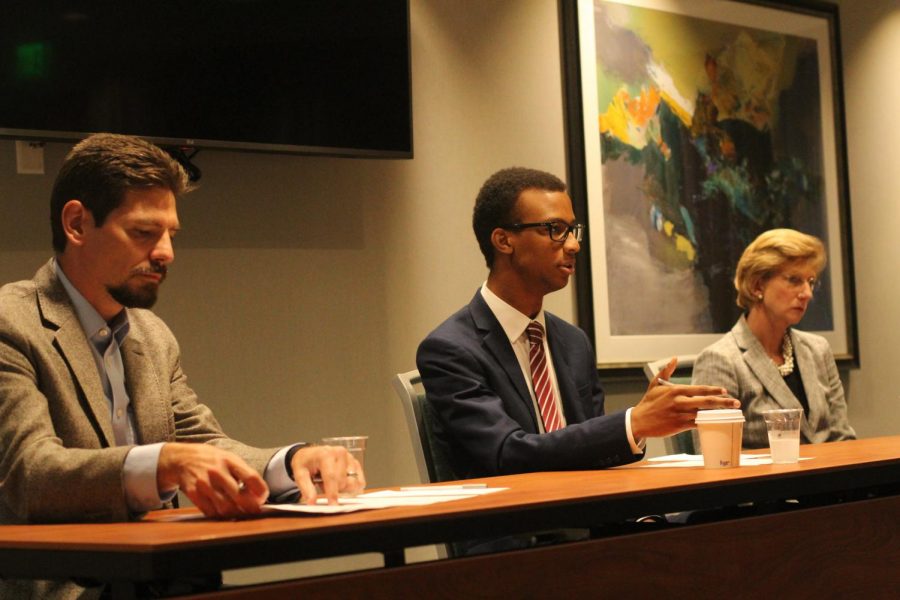Panelists discuss free speech on campus
Clarissa Pacheco – The State Hornet
Floyd Johnson II, president of the Sacramento State College Republicans (middle), discusses with panelists Jim Manley (left) and Leslie Gielow Jacobs (right) about free speech on college campuses. The discussion was held at the Hampton Inn & Suites Sacramento at CSUS hotel on April 10, 2018.
April 11, 2018
The survival of free speech on college campuses was the subject of a panel discussion on Tuesday at the Hampton Inn and Suites Sacramento that was co-hosted by the Sacramento State College Republicans.
The College Republicans and The Goldwater Institute hosted panelists including Jim Manley, an attorney for Pacific Legal Foundation and senior fellow for The Goldwater Institute, Leslie Gielow Jacobs, a law professor at McGeorge School of Law, and Floyd Johnson II, the president of the College Republicans and a student at Sac State.
Panelists said that the importance of free speech is to facilitate democratic values and in particular, to prevent against government censorship.
“When you have rulers with power, they like to keep it,” Jacobs said.
She added that letting the government be able to choose what people can say and not say is the biggest danger.
Manley discussed the marketplace of ideas and said universities are a place to think the unthinkable and determine what the truth is.
“When we have the school as an agent of the government or even the rest of the community acting as a censor and prohibiting certain ideas from being discussed because they are outside the intellectual orthodoxy of the school, each of us loses the opportunity to make the decision for ourselves about what is right and what is wrong,” Manley said.
Johnson said his goal in hosting the panel was to point out that freedom of speech extends to someone like Ben Shapiro, a conservative writer who speaks at campuses, or the controversial provocateur Milo Yiannopoulos — often associated with the so-called “alt-right” — whose planned speech at UC Berkeley last year led to violence.
Hate speech was a big topic in the evening’s panel and Johnson said that the college administration should address that they do not stand for people who try to stop it.
Johnson said that the administration should say, “You may not like the speaker, but this speaker has the right to speak on campus and if you attempt to prevent a speaker from speaking on campus, then action will be taken against you, you will be sanctioned, there will be disciplinary measures taken.”
The University Policy Manual regarding speech-related activities, which was last updated in October 2016, states that “It is the policy of California State University, Sacramento to permit the fullest expression of beliefs through any means, including protest and demonstration, that do not incite or promote illegal activity or disrupt the educational process.
“Freedom of expression activities and posted materials may direct messages perceived to be hurtful and/or hateful toward an individual or group. While there will always be disagreements over what may constitute good taste or appropriate comment, there can be no question, particularly in a university, that freedom of expression as guaranteed by the First Amendment of the Constitution is a cherished and protected right.”
Johnson added that students need to be more tolerant of opposing views and that there can be disagreements as long as there is tolerance.
Manley said that the general population should feel that free speech is necessary in preserving democracy.
“It’s so vitally important to our nation to have something that’s guaranteed to us that allows us to say things, to allow us to have discourse, and things that we disagree about,” Manley said.
To conclude the discussion, the panelists were all asked if free speech would survive. They all answered, “Yes.”
































































































































